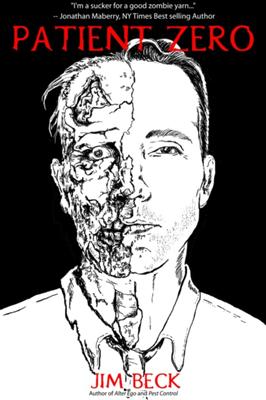 Just when I thought that the zombie subgenre had reached a saturation point, Jim Beck comes along with Patient Zero and proves that a clever idea can take an old idea and provide fresh flesh for hungry readers.
Just when I thought that the zombie subgenre had reached a saturation point, Jim Beck comes along with Patient Zero and proves that a clever idea can take an old idea and provide fresh flesh for hungry readers.
No pun intended.
Beck spins a simple story that is veined with strands of Frankenstein and moments of tenderness and melancholy. Bob Forrester is a man with a problem—a brain tumor. The recipient of an experimental procedure, he finds himself facing a second chance at life. Within just a short time, however, that new life becomes a mixed blessing, with side effects that are strange, slowly creeping upon him silently and, occasionally, violently. Before long, Forrester comes to the conclusion that readers have anticipated from the opening page: his flesh is dying and he is becoming a zombie.
It’s a story that we’ve read before—whether it’s caused by a virus, voodoo magic, or an alien microbe, and Beck makes no effort to surprise the reader here. Uniquely, though, Beck makes the zombie virus a central character in the story. It’s a twist that not only allows the reader a larger view of the outbreak, but shifts the conflict from an externally driven conflict to a more relationship focused story about Forrester and his son. Yes, there are moaning zombies, shotguns and baseball bats, guts and brains. On the other hand, there is also the close relationship between Bob Forrester and his son, the only thing holding them up.
It’s that bitter-sweet relationship, strengthening even as Bob recognizes the weakening of his flesh towards putrescence and impending zombie-hood, that makes Patient Zero more than a blood soaked horror.
The tender relationship between the two waxes over the course of Bob’s treatment and subsequent demise, even as the world is falling apart around them. Yet, just as Beck takes us the final tragic scene, we are left wondering—what does the future hold? Is there hope?
Beck’s Patient Zero is perhaps best considered, then, as this: a study of two men—a father and a son—as they face the horrific and the tragic. The twist he uses to narrate is clever, if less than subtly executed. As his first novel, Beck seems to be searching for the right voice to tell his story. The tone is conversational, almost too relaxed, and at times I found myself wondering how a scene might change with a more developed plot, or with a more complex conflict.
If Patient Zero is lacking in any respect, it is only in Beck’s colloquial tone, giving even the most nefarious character an almost laid back tone rooted in the pop culture references of our time. And perhaps that works: the novel does take place in the present. It’s a risky effort, though, and it denies Patient Zero the opportunity for relevance outside of middle America.
In the end, though, Beck is true, wittingly or not, to the source of the original zombie—Frankenstein. His creature is human, but losing his humanity. He feels and needs the love of those around him, even while he hurts and threatens them. He is a monster, with one step in this world and one in that of the dead, the living dead. It is a tragedy more than a horror, and that in itself is worth the read.
Links
Get an Editorial Review | Get Amazon Sales & Reviews | Get Edited | Get Beta Readers | Enter the SPR Book Awards | Other Marketing Services






















I am definitely leaning toward adding this one to my list of must reads based on this review alone.
Nice review overall, but if Frankenstein was the original zombie, then who was Jesus Christ? Just sayin’…
Big difference between reanimating dead flesh and completely renewing the flesh altogether.
If you say so 🙂
To clarify what might otherwise come across as a snide remark, let me just state for the record that my personal belief is that Jesus was in fact a zombie. I know some people believe that he went up to Heaven, and while I recognize and respect that as another possible interpretation, I dunno… There seems to be just as much historical evidence (which is to say not a lot) that he rose from the dead as a zombie and wandered off into the desert instead, unwilling to inflict violence against his fellow man despite his unbearable craving for brains. I mean, if anyone could resist that temptation, wouldn’t it be the big JC?
It would explain the concurrent popularity of the Bible and zombie genre fiction, after all…